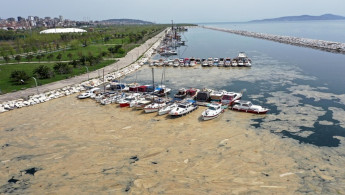'Sea snot' threatens Turkey's fishing industry
Turkey has vowed on Saturday to fend off "sea snot" building up in its waters after a slimy mucus-like matter spread along Istanbul’s shoreline, damaging marine life and the fishing industry.
President Recep Tayyip Erdogan Sea said he was hopeful that his government "will save our seas from this mucilage calamity", according to a BBC report.
The recent outbreak, which took place along large areas of the Sea of Marmara connecting the Black Sea to the Aegean Sea, is believed to be the biggest in history.
The naturally occurring marine mucilage consists of a thick coating of microalgae that can deprive corals, mussels, crabs, and other sediment-dwellers of oxygen, damaging the fishing industry.
Istanbul, Turkey's largest city with some 16 million residents, and five other provinces have been affected.
WATCH: A thick, slimy layer of so-called ‘sea snot’ is spreading in Turkey's Sea of Marmara to the south of Istanbul, posing a threat to marine life and the fishing industry https://t.co/gmc8UijFMe pic.twitter.com/Yrdriuyuh1
— Reuters (@Reuters) June 5, 2021
While the reasons behind its formation are unclear, researchers suspect 'sea snot' is formed as a result of hot weather and water pollution.
Erdogan blamed untreated sewage dumped into the sea and the rising temperatures, and dispatched a 300-strong team to inspect potential sources of pollution.
"My fear is, if this expands to Black Sea... the trouble will be enormous. We need to take this step without delay," he said.
It first appeared in Turkey in 2007 but has since been discovered in the Aegean Sea near Greece and along Italy’s coast.





 Follow the Middle East's top stories in English at The New Arab on Google News
Follow the Middle East's top stories in English at The New Arab on Google News


